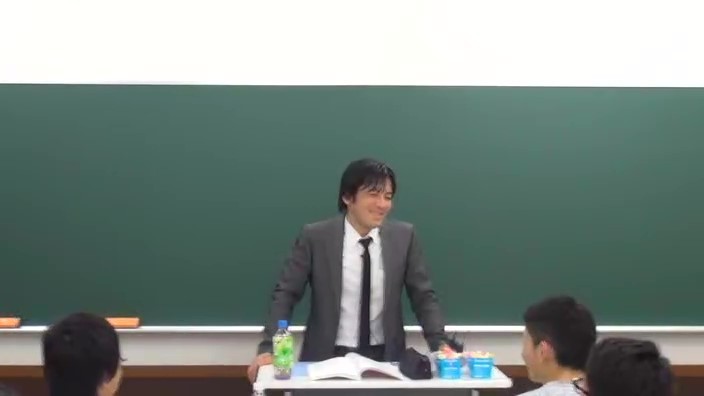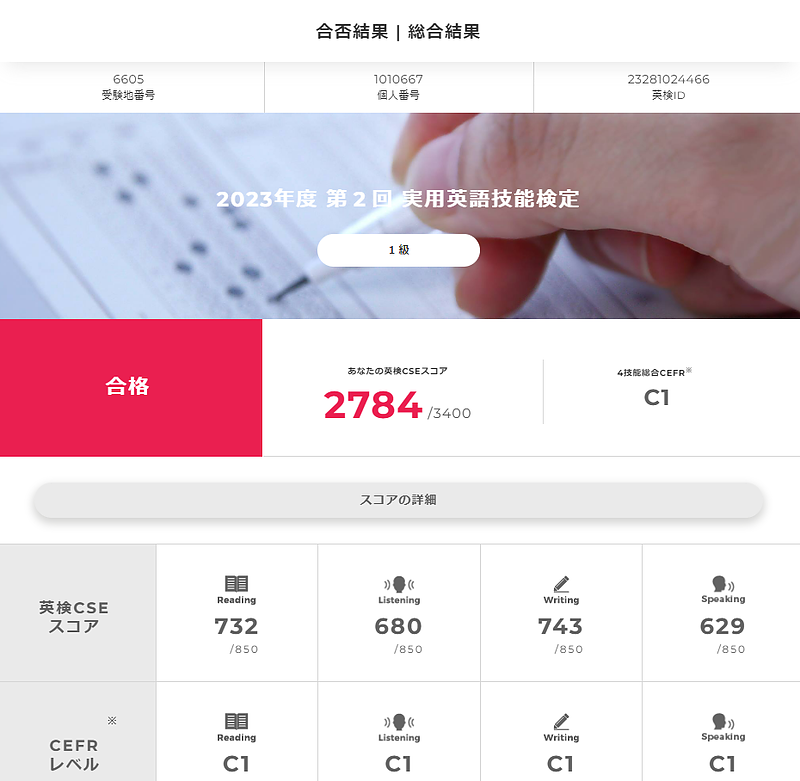英文法5分ドリル【動詞】⑤
“Do you like that song?”
“Yes, I do. It always ( ) me of my happy school days.”
① recalls
② recollects
③ remembers
④ reminds
me の後の〈人〉 of に注目する。
「思い出す」の意でこの形を取れるのは remind だけ。
◆『思い出す』
✰ 〈物/事〉remaind〈人〉of〈事柄〉
✰ 〈物/事〉remaind〈人〉to do
✰ 〈物/事〉remaind〈人〉that 文
✰ 〈思考〉occur to〈人〉
✰ 〈思考〉strike〈人〉
✰ 〈思考〉hit〈人〉
✰ 〈人〉hit (up)on〈思考〉
✰ 〈人〉come up to〈思考〉
✰ 〈人〉think of〈思考〉
✰ 〈人〉remember〈事柄〉
✰ 〈人〉recall〈事柄〉
✰ 〈人〉recollect〈事柄〉
✰ 〈人〉think of〈事柄〉
正解:④
「その歌が好きですか」「はい。それはいつも私に幸せな学校時代を思い出させます」
“Do you like that song?”
“How do you feel about that song?”
“Is that song to your liking?”
“Do you enjoy that particular song?”
“What are your thoughts on that song?”
“Yes, I do. It always reminds me of my happy school days.”
"Yes, I do. It always brings back memories of my happy school days.”
"Certainly! That song always evokes memories of my joyful school days.”
"Absolutely! That song reminds me of the happy times during school.”
"Indeed, I do. It brings to mind the joy of my school days.”
【関連】
★〈物/事〉remind〈人〉of〈事柄〉:
The old photograph reminded her of her childhood.
(その古い写真は彼女に彼女の子供時代を思い出させた)
★〈物/事〉remind〈人〉to do:
The sticky note on the door reminded him to buy groceries.
(ドアの上のふせんは彼に食料品を買うことを思い出させた)
★〈物/事〉remind〈人〉that 文:
The calendar reminder me that it was my friend's birthday.
(カレンダーのリマインダーは私に友達の誕生日であることを思い出させた)
★〈思考〉occur to〈人〉:
It suddenly occurred to her that she had left her keys at home.
(彼女は突然、家に鍵を忘れてきたことに気づいた)
★〈思考〉strike〈人〉:
Inspiration struck him in the middle of the night.
(夜中にひらめきが彼に訪れた)
★〈思考〉hit〈人〉:
The realization hit him when he saw the damage to his car.
(彼は自分の車の損傷を見て、理解が訪れた)
★〈人〉hit (up)on〈思考〉:
She hit upon a brilliant idea for the project.
(彼女はプロジェクトのための素晴らしいアイディアにたどり着いた)
★〈人〉come up to〈思考〉:
The solution came up to him while he was taking a shower.
(シャワーを浴びている最中に、彼に解決策が浮かんできた)
★〈人〉think of〈思考〉:
He thought of a new strategy to improve efficiency.
(彼は効率を向上させるための新しい戦略を考えた)
★〈人〉remember〈事柄〉:
I suddenly remembered that I had a meeting in the afternoon.
(私は突然、午後に会議があることを思い出した)
★〈人〉recall〈事柄〉:
She struggled to recall the details of the conversation.
(彼女は会話の詳細を思い出そうと努力した)
★〈人〉recollect〈事柄〉:
After a moment, he recollected the events of that day.
(しばらくしてから、彼はその日の出来事を思い出した)
★〈人〉think of〈事柄〉:
Whenever he sees a sunset, he thinks of his hometown.
(彼は夕日を見るたびに、故郷を思い出す)
May I ( ) a very special favor of you?
① tell
② ask
③ want
④ give
ask「AにBを尋ねる」は第3文型〈SVO〉動詞だが
「AにBを求める」の場合は
<ask A for B>の形で用いる。
ただし,B が a favor (親切な行為) の時に限り
第4文型 〈SVOO〉が可能。
本文を言い換えると,
☆ Would you do me a favor?
☆ May I ask a favor of you?
☆ I was wondering if I could ask you a favor.
正解:②
「お願いがあるのですが」
May I ask a very special favor of you?
Could I request a particularly important favor from you?
Is it permissible for me to ask for a special favor from you?
Might I seek a special favor from you?
Would it be possible for me to request a special favor from you?
【関連】
Can I ask you a question?
質問してもいいですか?
She asked him for help with her homework.
彼女は彼に宿題の手伝いを頼んだ。
I asked the teacher about the upcoming exam.
私は先生に次の試験について尋ねました。
He asked if I wanted to go to the movies with him.
彼は私に映画に行きたいかどうか聞いてきた。
They asked for directions to the nearest train station.
彼らは最寄りの駅への行き方を尋ねました。
I asked my friend to pick up some groceries on the way home.
帰りに友達に食料品を買ってくるよう頼みました。
The child asked for a bedtime story before going to sleep.
子供は寝る前にお話をしてほしいと頼んだ。
She asked him out for dinner on Friday night.
金曜日の夜に彼女は彼に夕食に誘いました。
He asked permission to leave the meeting early.
彼は会議を早退する許可を求めました。
He ( ) his teacher of his success in the examination.
① informed
② reported
③ noticed
④ suggested
<inform A of B>
「BのことをAに知らせる」
② report, ④ suggest は人を目的語に取らない。
③ notice「~に気がつく」は意味も合わないし
後にA of Bの形も取らない。
◆ 《 S V O of 名 》:
『期待』:
✰ ask(求める)
✰ expect(期待する)
『情報供給』:
✰ inform(知らせる)
✰ remind(思い出させる)
『除去』
✰ clear(片づける)
✰ cure(治療する)
✰ deprive(奪う)
✰ rob(奪う)
正解:①
「彼は試験がうまくいったことを先生に報告した」
He informed his teacher of his success in the examination.
He shared news of his success in the examination with his teacher.
He let his teacher know about his success in the examination.
He reported his examination success to his teacher.
He communicated the news of his examination success to his teacher.
【関連】
<S V O of 名>
★『期待』:
I asked him of his promise.
彼に彼の約束を尋ねた。
She expects them of punctuality.
彼女は彼らに時間通りの到着を期待している。
★『情報供給』:
He informed me of the decision.
彼は私にその決定を知らせた。
The note reminded her of the meeting.
メモは彼女にその会議を思い出させた。
★『除去』:
They cleared the room of the clutter.
彼らは部屋の散らかりを片づけた。
The medicine cured him of the illness.
その薬は彼をその病気から治療した。
The storm deprived us of electricity.
その嵐は私たちに電気を奪った。
The thief robbed her of her purse.
泥棒は彼女から財布を奪った。
Her parents didn’t ( ) her to go to America.
① admit
② allow
③ forgive
④ let
<allow A to do>
「Aが ~ するのを許す」
letを用いて書き換えると,
Her parents didn’t let her go to America.
第5文型〈SVOC〉を取る動詞は
知覚動詞・使役動詞をまず覚えて,
それ以外が〈S V O to do〉第5文型動詞と抑える。
この種の動詞は
「OがCすることをVする」
という「行動促進」の意味内容を持つと言える。
正解:②
「彼女の両親は彼女をアメリカに行かせなかった」
Her parents didn’t allow her to go to America.
Her parents prohibited her from traveling to America.
Her parents disallowed her from going to America.
Her parents refused permission for her to go to America.
Her parents denied her the opportunity to go to America.
【関連】
◆ 第5文型動詞
O-C〈能動関係〉<V O to do>
O-C〈受動関係〉<V O to be done>
✰ 願 望 ➪ like/want/desire/wish
✰ 要 求 ➪ ask/request/require
✰ 許 可 ➪ allow/permit
✰ 強 制 ➪ compel/force/oblige
✰ 期 待 ➪ expect
✰ 命 令 ➪ order/tell
✰ 可 能 ➪ enable
✰ 認 識 ➪ think/consider/believe
✰ 原 因 ➪ cause/lead
✰ 勧 告 ➪ persuade (説得する)/urge (駆り立てる)/advise
◇ 願望:
<V O to do>
I want him to complete the project by next week.
彼に来週までにプロジェクトを完成させて欲しい。
<V O to be done>
He is wanted to be interviewed for the position.
彼はそのポジションの面接を受けるように求められている。
◇ 要求:
<V O to do>
She asked asked them to send the documents as soon as possible.
彼女は彼らにできるだけ早く文書を送るように頼んだ。
<V O to be done>
The report is required to be submitted by the end of the month.
その報告書は月末までに提出される必要がある。
◇ 許可:
<V O to do>
The teacher allows the students to use calculators during the exam.
先生は生徒たちが試験中に電卓を使うことを許可しています。
<V O to be done>
Dogs are permitted to be brought into the park on a leash.
犬はリードをつけて公園に連れて行かれることが許可されています。
◇ 強制:
<V O to do>
The law compels companies to disclose their financial information.
その法律は企業に財務情報を公開することを強制しています。
<V O to be done>
Employees are forced to undergo safety training annually.
従業員は毎年安全トレーニングを受けるように強制されています。
◇ 期待:
<V O to do>
We expect them to arrive on time for the meeting.
会議には時間通りに到着することを期待しています。
<V O to be done>
The project is expected to be completed by the end of the year.
そのプロジェクトは年末までに完成することが期待されています。
◇ 命令:
<V O to do>
The manager ordered the team to review the proposal.
マネージャーはチームに提案書を再検討するよう命じた。
<V O to be done>
All employees were told to attend the mandatory training session.
すべての従業員には強制的なトレーニングセッションに出席するように言われました。
◇ 可能:
<V O to do>
The new software enables users to create customized reports.
新しいソフトウェアはユーザーがカスタマイズされたレポートを作成できるようにします。
<V O to be done>
The special key enables the door to be opened remotely.
その特別なキーはドアが遠隔で開けられるようにします。
◇ 認識:
<V O to be done>
I consider him to be a reliable colleague.
私は彼を信頼できる同僚だと考えています。
<V O to be done>
She thinks the project to be too ambitious.
彼女はそのプロジェクトがあまりにも野心的すぎると考えています。
◇ 原因:
<V O to be done>
The accident caused the road to be closed for hours.
その事故のせいで道路が数時間閉鎖されました。
<V O to do>
Their actions led the company to face financial difficulties.
彼らの行動が会社に財政的な困難に直面させました。
◇ 勧告:
<V O to do>
She persuaded him to join the project.
彼女は彼にプロジェクトに参加するよう説得しました。
<V O to do>
I urge you to consider the proposal carefully.
注意深くその提案を考慮するようにあなたに促します。
My pride ( ) me from borrowing money from him.
① forced
② helped
③ prevented
④ refused
S V O from doing の語法で用いる動詞を考える。
<prevent A from doing>
「Aが~することを妨げる」
正解:③
「彼から借金をするほど私のプライドは低くなかった」
My pride prevented me from borrowing money from him.
My pride stopped me from seeking a loan from him.
My pride hindered me from borrowing money from him.
My pride kept me from asking him for a loan.
My pride restrained me from borrowing money from him.
【関連】
<妨害動詞 A from B>
「AがBするのを妨げる」
prevent/hinder/keep/stop/deter/discourage
これらの動詞は、それぞれの文脈で異なるニュアンスがあるが、
ある行動や活動を抑制し、
それを行わないようにする際に使用される。
✰ prevent:
The lock on the door prevented him from entering the room.
ドアの鍵が彼が部屋に入るのを妨げた。
✰ hinder:
The bad weather hindered us from reaching our destination on time.
悪天候が私たちが時間通りに目的地に到達するのを妨げた。
✰ keep:
The security guard kept the protesters from approaching the building.
セキュリティガードが建物に近づくのを妨げた。
✰ stop:
The police officer stopped the protesters from entering the restricted area.
警察官は抗議者が制限されたエリアに入るのを止めた。
✰ deter:
The warning signs are meant to deter people from trespassing.
警告標識は侵入するのを人々が思いとどまるようにするためのものだ。
✰ discourage:
The challenging task didn't discourage her from attempting it.
難しい課題は彼女が挑戦するのを思いとどまらせなかった。
実験を行えば,どこが間違っているかわかるだろう。<1語不要>
【enable / will / you / be / experiment】 to find out what is wrong.
『〈人〉が~することを可能にする』
✰ N enables〈人〉to do
✰ N makes it possible for〈人〉to do
✰ Thanks to N,〈人〉can do …
『〈人〉が~することを不可能にする』
✰ N makes it impossible for〈人〉to do
✰ Because of N,〈人〉can’t do …
正解:
Experiment will enable you to find out what is wrong.
Experimentation will empower you to identify what is incorrect.
Conducting experiments will allow you to discover what is amiss.
Through experimentation, you can ascertain what is wrong.
Experimenting will enable you to pinpoint what is incorrect.
【関連】
『〈人〉が~することを可能にする』:
✰ N enables 〈人〉 to do:
Technology enables students to access information quickly.
テクノロジーは学生が迅速に情報にアクセスすることを可能にしています。
✰ N makes it possible for 〈人〉 to do:
The new law makes it possible for citizens to vote online.
新しい法律により市民がオンラインで投票することが可能になります。
✰ Thanks to N, 〈人〉 can do …:
Thanks to the new software, employees can collaborate more efficiently.
新しいソフトウェアのおかげで、従業員はより効率的に協力できます。
『〈人〉が~することを不可能にする』:
✰ N makes it impossible for 〈人〉 to do:
The lack of funds makes it impossible for the project to proceed.
資金不足のため、プロジェクトが進行することは不可能です。
✰ Because of N, 〈人〉 can’t do …:
Because of the storm, we can't go on our outdoor trip.
嵐のため、我々はアウトドア旅行ができません。
【音読基本英文】
「その歌が好きですか」「はい。それはいつも私に幸せな学校時代を思い出させます」
“Do you like that song?”
“How do you feel about that song?”
“Is that song to your liking?”
“Do you enjoy that particular song?”
“What are your thoughts on that song?”
“Yes, I do. It always reminds me of my happy school days.”
"Yes, I do. It always brings back memories of my happy school days.”
"Certainly! That song always evokes memories of my joyful school days.”
"Absolutely! That song reminds me of the happy times during school.”
"Indeed, I do. It brings to mind the joy of my school days.”
「お願いがあるのですが」
May I ask a very special favor of you?
Could I request a particularly important favor from you?
Is it permissible for me to ask for a special favor from you?
Might I seek a special favor from you?
Would it be possible for me to request a special favor from you?
「彼は試験がうまくいったことを先生に報告した」
He informed his teacher of his success in the examination.
He shared news of his success in the examination with his teacher.
He let his teacher know about his success in the examination.
He reported his examination success to his teacher.
He communicated the news of his examination success to his teacher.
「彼女の両親は彼女をアメリカに行かせなかった」
Her parents didn’t allow her to go to America.
Her parents prohibited her from traveling to America.
Her parents disallowed her from going to America.
Her parents refused permission for her to go to America.
Her parents denied her the opportunity to go to America.
「彼から借金をするほど私のプライドは低くなかった」
My pride prevented me from borrowing money from him.
My pride stopped me from seeking a loan from him.
My pride hindered me from borrowing money from him.
My pride kept me from asking him for a loan.
My pride restrained me from borrowing money from him.
実験を行えば,どこが間違っているかわかるだろう。
Experiment will enable you to find out what is wrong.
Experimentation will empower you to identify what is incorrect.
Conducting experiments will allow you to discover what is amiss.
Through experimentation, you can ascertain what is wrong.
Experimenting will enable you to pinpoint what is incorrect.
要点整理【動詞】
1. 動名詞をとる他動詞
(1) mind 「〜を気にする」
(2) enjoy 「〜を楽しむ」
(3) give up 「〜をあきらめる」
(4) avoid 「〜を避ける」
(5) finish 「〜を終える」
(6) escape 「〜を免れる」
(7) put off 「〜を延期する」
(8) stop 「〜を⽌める」
(9) consider 「〜を考える」
(10) admit 「〜を認める」
(11) deny 「〜を否定する」
(12) miss 「〜を逃す」
(13) practice 「〜を練習する」
(14) appreciate 「〜を感謝する」
2. 不定詞をとる他動詞
(1) decide to 「〜するのを決める」
(2) promise to 「〜する約束する」
(3) fail to 「〜しない・できない」
(4) afford to 「〜する余裕がある」
(5) pretend to 「〜するふりをする」
(6) manage to 「なんとか〜する」
(7) intend to 「〜しようとする」
(8) refuse to 「〜するのを拒否する」
(9) hesitate to 「〜するのをためらう」
(10) plan to 「〜を計画する」
3. 意味の相違
(1) remember to 「忘れずに〜する」
remember -ing 「〜したことを覚えている」
(2) forget to 「〜するのを忘れる」
forget -ing 「〜したことを忘れる」
(3) try to 「〜しようとする」
try -ing 「ためしに〜する」
(4) regret to 「残念ながら〜する」
regret -ing 「〜したのを後悔する」
(5) stop to 「〜するために⽴ち⽌る」
stop -ing 「〜するのを⽌める」
(6) need to 「〜する必要がある」
need -ing 「〜される必要がある」
(7) want to 「〜したいと思う」
want -ing 「〜される必要がある」
4. 頻出語法
(1) explain(to 人) that 〜
「(人に)〜だと説明する」
(2) insist on -ing
「〜することを主張する」
insist that S (should) V
「〜だと主張する」
(3) complain of [about] -ing
「〜することに不平を⾔う」
complain that 〜
「〜だと不平を⾔う」
(4) advise人 to do
「〜に〜するように忠告する」
advise that S (should) V
「〜が〜するように忠告する」
(5) rob [deprive] A of B
「A からB を奪う」
(6) clear A of B
「A からB を取り除く」
(7) cure [heal] A of B
「A のB(病気)を治す」
◆ suggest
(1) suggest (to人) that S (should) V ~
「(人に)~ということを提案する」
(2) suggest -ing 「~することを提案する」
(3) suggest ~(to人) 「~を(人に)思い出させる」
(4) suggest itself (to 人) 「~が(人の)心に浮かぶ」
5.借りる・貸す
◆「借りる」
☆ borrow (無料+移動)
☆ rent (有料)
☆ hire (有料+一時的)
☆ use (一時的+移動不可)
◆「貸す」
☆ lend (無料)
☆ rent (有料)
6.「言う」
(1) say
say (to 人) that ~ 「~と(人に)言う」
say (to 人), “~” 「~と(人に)言う」
(2) tell
tell 人 that ~ 「~と~に言う」
tell 人 to do 「~に~するように言う」
tell 人 of [about] 事柄 「~に~について言う」
(3) talk
talk to 人 「~に話しかける」・
talk with 人 「~と話をする」
talk of [about/over] 事柄 「~について話す」
talk 人into doing 「~に~するように説得する」
talk 人 out of doing 「~に~をやめるように説得する」
(4) speak
speak 言語/言葉 「~を話す(言う)」
speak to 人 「~に話しかける」
speak with 人 「~と話をする」
speak of [about/over] 事柄 「~について話す」
7. 成句として処理するもの
(1) tell A from B 「A とB を区別する」
tell on 「~に影響を与える」
(2) talk人 into doing 「~に~するように説得する」
talk人 out of doing 「~に~をやめるように説得する」
◆ think/believe/say
(1) They think that he is honest.
「彼は正直だと思われている。」
= △ That he is honest is thought by them.
= ○ It is thought that he is honest.
= ○ They think him (to be) honest.
= ○ He is thought to be honest.
(2) They believe that he is honest.
「彼は正直だと信じられている。」
= △ That he was honest is believed by them.
= ○ It is believed that he is honest.
= ○ They believe him (to be) honest.
= ○ He is believed to be honest.
(3) They say that he is honest.
「彼は正直だと言われている。」
= △ That he was honest is said by them.
= ○ It is said (by them) that he is honest.
= ×They say him to be honest.
= ○ He is said to be honest.
8. 《仮定法現在》
I demanded that he (should) pay the bill.
私は彼に支払いを要求した。
(1) that 節中の should は訳さない(省略可)
(2) that 節中の動詞は常に原形
☆ 命 令 order, command
☆ 決 定 decide, determine
☆ 要 求 demand, require, request
☆ 提 案 suggest, propose, recommend
☆ 主 張 insist
9. 動詞 A from B
(1) prevent / hinder / keep / stop / deter A from B
「A がB するのを妨げる」
(2) tell / distinguish / know A from B
「A とB を区別する」
(3) separate A from B
「A をB から分離する」
(4) isolate A from B
「A をB から孤立させる」
order A from B
「A をB に注文する」
derive A from B
「A をB から引き出す」
Their pride prevented them from accepting our offer.
彼らは自尊心が強いので私たちの申し出を受け入れなかった。
Can you distinguish a wolf from a dog?
オオカミと犬の区別がつきますか。
10. 動詞A of B 〈情報〉のof
(1) remind A of B
「A にB を思い出させる」
= remind A that B
(2) inform A of B
「A にB を知らせる」
= inform A that B
(3) convince A of B
「A にB を確信させる」
= convince A that B
(4) persuade A of B
「A にB を納得させる」
= persuade A that B
(5) assure A of B
「A にB を保証させる」
= assure A that B
I informed him of her arrival.
I informed him that she arrived.
私は彼に彼女が到着したことを伝えた。
11. 動詞A of B 〈分離〉の of
(1) rob [deprive] A of B
「A からB を奪う」
(2) clear [rid / relieve / strip] A of B
「A から B を取り除く」
(3) cure A of B
「A のB を治す」
12. 感情動詞 = 他動詞
☆ surprise 「驚かせる」
☆ amaze 「驚かせる」
☆ please 「喜ばせる」
☆ injure 「傷つける」
☆ bore 「退屈させる」
☆ satisfy 「満足させる」
☆ disappoint 「失望させる」
☆ excite 「興奮させる」
☆ relieve 「安心させる」
(1) He was disappointing.
彼は失望させるような奴だ。
▸ 彼は期待はずれな奴だった。
(2) He was disappointed.
彼は失望させられた。
▸ 彼はがっかりしていた。
13. pay
(1) I pay ten dollars for this book two years ago.
2 年前にはこの本は10 ドルしました。
(2) Honesty does not always pay.
正直がいつも割りに合うとは限らない。
14. save
save + O1 + O2
「O1 から O2 を省く」
This new machine will save you a lot of time and trouble.
この新しい機械のおかげで時間と手間がずいぶん省けるだろう。
15. spare
spare + O1 + O2
「O1 に O2 を割く・取っておく」
Will you save me a few minutes?
= Will you save a few minutes for me?
私にしばらく時間を頂けないでしょうか。
16 help
(1) help +人+ (to) do 「人が〜するのを手伝う」
(2) help +人+ with 物事 「人が〜するのを手伝う」
(3) help (to) do 「〜するのに役⽴つ」
(4) help A to B 「A にB を取ってやる」
(5) help 人以外 「〜を避ける」
*cannot but do 「〜せずにはいられない」
= cannot help doing.
Please help yourself to the cake.
どうぞご自由にケーキをお取り下さい。
17. come/bring
(1a) come to do 「〜するようになる」
(1b) bring oneself to do 「〜する気になる」
(2a) come about 「〜が起こる」
(2b) bring about 「〜を引き起こす」
(3a) come into being 「〜が現れる」
(3b) bring 〜 into being 「〜を⽣み出す」
18. give
(1) give away 「~をただでやる」
(2) give in to 「~に降参する」
(3) give off 「(におい・光など)を発する」
(4) give up 「~をやめる」
(5) give out 「~が尽きる・~を発表する」
19. do
(1) do +利益/損害「~を与える」
(2) What … do with ? 「~をどうするのか」
(3) do without 「~なしですます」
(4) have something to do with
「~と関係がある」
have much to do with
「~と大いに関係がある」
have nothing [little] to do with
「~と全く[ほとんど]関係がない」
(5) do away with
「~を廃止する」
20. result
(1) 原因 result in 結果 「結果として~になる」
(2) 結果 result from 原因 「~の結果起こる」
(3) as a result (of ~) 「(~の)結果」
今後も英語学習に関わる情報、体験談を発信していきます。










